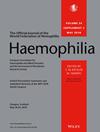Management of Pregnancy, Delivery, and Postpartum in Italian Carriers and Women With Haemophilia A and B
Abstract
Introduction
Managing pregnancy in carriers/women with haemophilia involves four key objectives: preconception and prenatal care, minimizing maternal bleeding, choosing the delivery mode to reduce foetal/neonatal bleeding, and postpartum care. The optimal factor VIII/IX level at delivery and the best delivery method to mitigate maternal and foetal complications are still debated.
Aim
To share real-world clinical management in Italian haemophilia treatment centres.
Methods
In March-April 2023, members of the Italian Association of Hemophilia Centers “AICE” were invited to an online survey to collect information on the management of pregnancy, delivery, and postpartum in carriers/women with haemophilia.
Results
Thirty-three centres responded. Plasma FVIII/FIX levels are systematically evaluated in the third trimester, considering a threshold above 50 U/dL essential for safe delivery and neuraxial analgesia. Overall, the haematologic counselling on delivery mode generally aligns with obstetric indications in 73% of centres. In women who will give birth to a known affected male foetus, 55% rely on obstetric indication, while 24% suggest spontaneous delivery and 21% planned caesarean section. Excluding those which follow obstetric indication, natural delivery and planned caesarean section are recommended respectively by 40% and 60% when prenatal diagnosis is available or by 20% and 80% when not available. All centres agree to avoid instrumental delivery in affected male foetus or when prenatal diagnosis has not been made.
Conclusion
Multidisciplinary pregnancy management is recommended. Delivery mode choice is primarily driven by ensuring the newborn's maximum protection. However, the use of caesarean section should also be weighted according to the mother's risk profile.


 求助内容:
求助内容: 应助结果提醒方式:
应助结果提醒方式:


